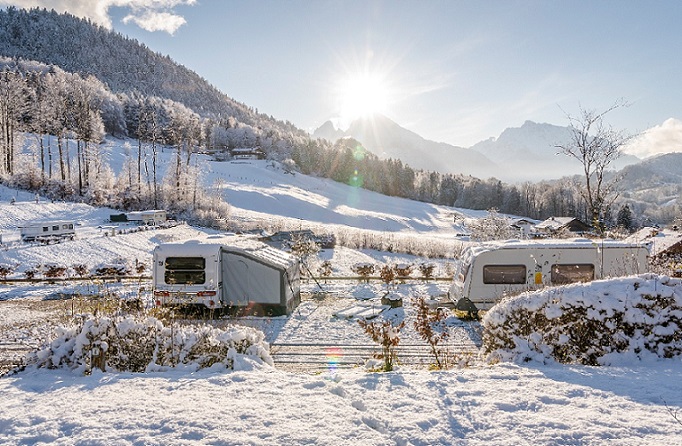Camping is only possible in the summer? Says who? Winter camping is becoming increasingly popular in Germany. Whether for skiing, as a wellness holiday or simply as a time-out in a snowy landscape: winter camping is fun - at least if you know what to consider beforehand.
Motorhomes and caravans are a good alternative to holiday homes, guesthouses, or hotels, also during the winter months. When camping in winter your motorhomes or caravans should be double-walled and have a double floor to provide proper insulation. To make sure it stays warm inside the vehicle during freezing temperatures, the walls must be at least 3cm thick, while the roof and floor should be at least 4cm thick. If the right equipment is used and everything is well planned out, unpleasant frosty surprises can be avoided.

We have compiled the most important tips for planning a winter camping holiday. Especially when it comes to equipment, winter camping clearly differs from summer holidays - with our to-do list you will be perfectly prepared for your winter camping holiday (even as a beginner):
Make your reservations in time, as well-established winter camping grounds are booked out quickly.
Winter tires for towing vehicles and trailers are a must during the winter months. In mountain areas, snow chains are obligatory as well. Practice installing the snow chains beforehand!
Change broken or fractured gas pipes. Use cold-resistant pipes in winter.
Test the heating system and fans: Open all cupboard doors, air vanes and storage boxes during the heating process to prevent water condensation.
Check exhaust pipe.
Fully charge batteries and keep them well charged during your holiday. Pack jumper cables and tow ropes.
Frost-proof the water tanks (fresh and processed service/industrial water), pipes and pumps. Install heating rods and frost monitor, if needed.
Use talcum powder or similar products on door and window gaskets.
For winter camping, a minimum of two gas bottles / 3 Kg of gas should be calculated per day.
An automatic switchover prevents the heating system from failing in the event that one gas bottle is empty at night. Be aware: Only use propane gas in winter. Butane gas stays liquefied at temperatures around 0°C or below.
A heating device on the gas bottle’s pressure regulator prevents the regulator from freezing at temperatures below 4°C. At temperatures below zero, the oils remain more fluid and the regulator remains functional.
Use anti-freeze for windshield wiper and radiator fluid.
Check which roads/routes are closed in winter.
Do not forget to bring a ladder, broom, and snow shovel.


